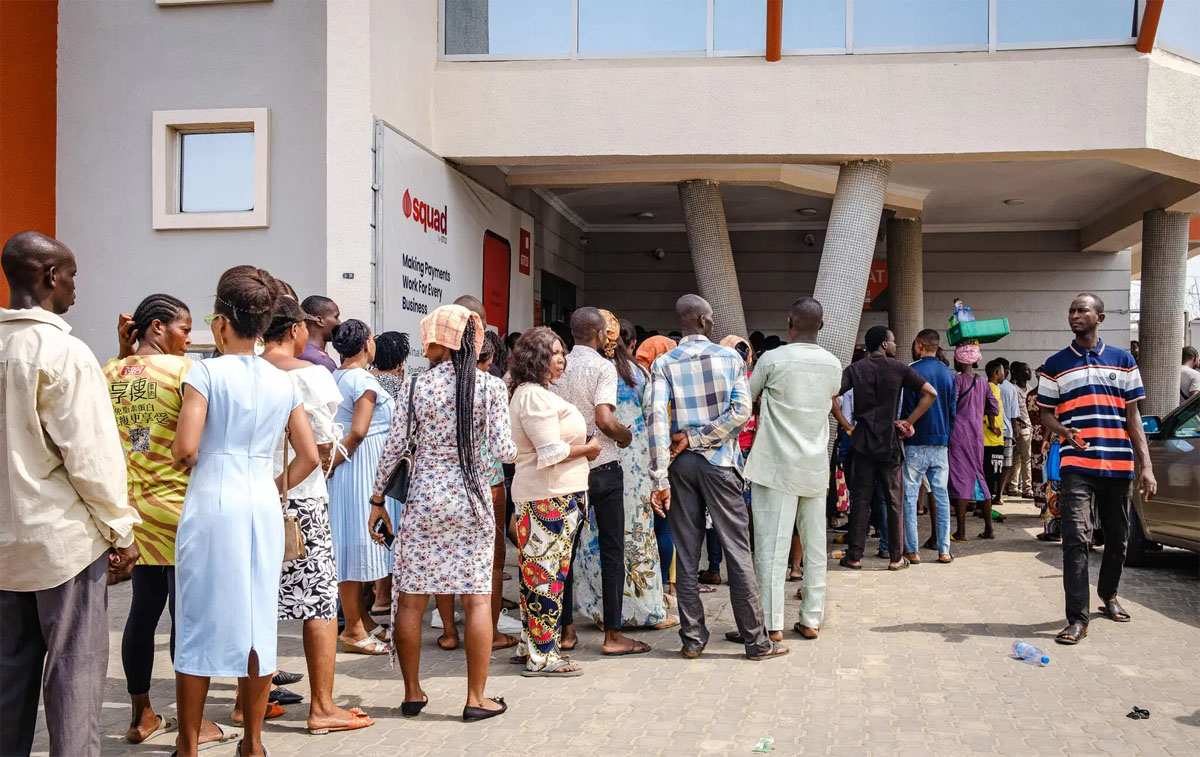metro
Updated: Panic in Lagos as violent protests spread, Jigawa recognises old naira notes

The riot that broke out early Friday morning in the Ketu/Mile 12 and Ojota areas of Lagos over inability of people to use old naira notes for daily transactions has spread to other parts of the state.
The violent protests captured on social media platforms caused serious traffic along the Ikorodu expressway.
The violence later spread to Agege, Ikorodu, Iyana Iba.
Motorists and other road users on their way to different places of work hurriedly turned back in panic as the rioters went berserk with bonfires set across the road.
In Jigawa State, the government has moved to prevent violence over the naira scarcity as it declares that the old naira notes remain legal tender in the state pending the judgment of the Supreme Court.
The Lagos protesters blocked the Ikorodu road with bonfires while many vehicles were reportedly vandalised in the process.
The protest was said to have started following the rejection of the old notes of N1000 (one thousand naira) and N500 (five hundred naira) by traders in the area.
Traders, who had come to the market early Friday were frustrated by the rejection of the old naira notes by traders at the market.
Lagos State Police Public Relations Officer, Benjamin Hundeyin, confirmed the unrest happening in the Mile 12 area of Lagos State.
He made this known via his Twitter handle on Friday.
Responding to a tweet asking the PPRO to confirm the rumour, Hundeyin replied, “ It is true. Our men are there. Reinforcement units have been deployed. Stay safe out there as we closely monitor and manage the situation.”
Lagos State Governor Babajide Sanwo-Olu, had earlier said his administration would prosecute anyone found rejecting the old naira notes.
But President Muhammadu Buhari, in a national broadcast on Thursday, directed the Central Bank of Nigeria to make only the old N200 available and allow it to be used along with the just redesigned notes while declaring that the old N1000 and N500 notes had ceased to be legal tender.
Meanwhile, the Jigawa State Government has said the old naira notes remain legal tender in the state pending the judgment of the Supreme Court.
The state Commissioner for Information, Youths Sports and Culture Bala Ibrahim Mamsa stated this in a statement issued to on Thursday.
According to him “Jigawa State is among the states before the Supreme Court of Nigeria the CBN and the court have issued an order “…restraining the CBN from suspending or determining or ending on the 10th of February, 2023 the time frame within which the now older versions of the 200, 500 and 1000 denominations of the naira may no longer be legal tender pending the hearing and determination of the …. Motion on notice…”
He said Jigawa State Government enjoined its citizens to desist from disobeying the law and causing hardships to the people of the state.
Mamsa stated that it has come to the government’s notice that some individuals and corporate bodies in the state are rejecting the now old N200, N500, and N1000 notes.
He said the government would take action against anyone found rejecting the old naira notes.
The commissioner, however, advised the general public to report any trader or business organizations that refused to accept the N200, N500, and N1000 notes as legal tender in Jigawa State to the nearest appropriate authorities.
metro
CBN fines any bank N150m hoarding cash

CBN fines any bank N150m hoarding cash
The Central Bank of Nigeria (CBN) has imposed a N150 million fine on a commercial bank for failing to dispense cash through its Automated Teller Machines (ATMs).
This action follows an unannounced inspection by the apex bank, which uncovered deliberate cash hoarding and ATM manipulation by the erring bank.
Sources within the CBN revealed that the sanctioned bank was caught disabling its ATMs, thereby denying customers access to their funds while prioritizing cash disbursements to select VIP clients.
A staff member of the CBN stressed that the apex bank would not tolerate such practices. “The Bank will not spare any Deposit Money Bank (DMB) caught in the act of hoarding cash or found favoring VIP customers over other customers,” the official stated.
To this end, the CBN has intensified spot checks on banks nationwide, exposing various illicit cash-handling practices by some unscrupulous financial institutions.
READ ALSO:
- Lagos-Calabar coastal road: Train track work begins 2025, says minister
- Three days to Christmas, food prices, transport fares hit the roof
- Three Ogun varsity students die auto crash
For now, the CBN is imposing financial penalties on defaulting banks. However, according to the official, the next phase of enforcement will include publicly naming and shaming offending banks and prosecuting implicated bank officials.
“This fine is just the beginning. The CBN is determined to hold banks accountable for any actions that undermine public trust and the integrity of the banking system,” the official added.
Despite the ongoing challenges, the CBN has reiterated its commitment to promoting cashless banking in the country. Another senior official disclosed that the apex bank’s management is intensifying efforts to encourage the use of electronic channels for transactions.
“The frustration faced by account holders is undermining our push for a cashless economy. We are doubling down on initiatives to restore public confidence in electronic banking solutions,” the official said.
CBN fines any bank N150m hoarding cash
metro
Three days to Christmas, food prices, transport fares hit the roof

Three days to Christmas, food prices, transport fares hit the roof
According to the Universal Declaration of Human Rights ,UDHR, Article 25(1), everyone has the right to standard of living adequate for their health and well-being, which includes access to food, clothing, and housing.
Similarly, the International Covenant on Economic, Social and Cultural Rights ,ICESCR, Article 11 emphasizes the right to an adequate standard of living, including sufficient food.
Furthermore, the Covenant recognizes the fundamental right to be free from hunger and advocates for measures both individual and international to eliminate hunger.
It is widely acknowledged that inadequate food availability can lead to health issues, as food is as essential to health as air is to breathing.
The situation is exacerbated by the rising costs of healthcare, which are increasingly out of reach for many due to ongoing inflation.
Difficult situations
In Nigeria, harsh economic conditions are forcing households into difficult situations, with many going to bed hungry due to skyrocketing food prices. With Christmas just three days away, our correspondents visited local food markets in Lagos and Abuja to see how citizens are coping with the rising cost of goods and services.
In the locations, buyers and sellers expressed their frustrations over the increasing prices of food items.
At Agric Market in Ikorodu, Mummy Somto, lamented that she had never witnessed such high prices in her lifetime.
She noted that a chicken that cost N15,000 last year now sells for N35,000, with only older layers available for N15,000.
READ ALSO:
- Three Ogun varsity students die auto crash
- Dangote, MRS agree to sell petrol at N935/litre nationwide
- How another Nigerian allegedly murdered by four South Africans
“What will that do for my family? We have never seen it like this in Nigeria. I hope this hope is the hope,” she said.
At Mile 12 International Market, trucks filled with perishable goods such as tomatoes, peppers, onions, cucumbers, potatoes, carrots, cabbages, and other vegetables were lined up for unloading while eager buyers waited nearby.
When asked about the high prices despite the abundance of food, truck owner Alhaji Shehu, explained that the situation arose from expenses related to diesel, farm security, police and military checkpoints before reaching Lagos.
He mentioned spending between N500,000 and N800,000 per truck, which inevitably raises prices.
“This is our business, and we are not pleased with the high costs either. If I sell my goods, I still need to buy what I don’t sell. It’s suffocating us. I also commend the buyers,” Shehu added.
Bags of rice
Mrs. Bukky Osagie, a rice vendor at Mike 12, shared her concerns about escalating prices: “Last December, a bag of rice was between N65,000 and N70,000. Today, it’s from N95,000 depending on the brand. Traders are exhausted. People are buying half bags because they can’t afford full ones. They also need to buy additional items. How do people survive this trend? This has to stop if the government truly cares for its citizens.”
At Daleko Market, Mrs. Hannah, was seen pricing vegetable oil when she declared, “Whether the devil likes it or not, we will celebrate with our families and share love during this season. We will just have to adjust our spending according to our means.”
READ ALSO:
- Copyright: Court orders Adele’s song removed from platforms
- Ibadan, Abuja, Anambra stampedes: IG orders probe, threatens prosecution of organisers
- Gabriel Jesus shines as Arsenal thrash Palace 5-1 in London derby
As of the time of filing this report, a 25-liter container of vegetable oil was selling for between N86,000 and N95,000 depending on the brand.
Garri was priced at N56,000, while Ijebu Gaari was N58,000.
A carton of satchel tomatoes ranged from N8,800 to N9,200 while a pack of spaghetti cost N23,000.
70 grams of noodles were priced between N9,800 and N10,500. A roll of curry or thyme sold for N550 each, while small bulbs of onion reached as high as N200, making them almost unaffordable for many.
Christmas cheer
In Abuja, soaring food prices and steep transportation costs are casting a shadow over Christmas celebrations for many families.
The cost of essential holiday items, such as poultry, has surged, with chickens priced between ¦ 15,000 and ¦ 25,000, and turkeys reaching up to ¦ 130,000 in some markets.
Sunday Vanguard learned that rising feed prices, transportation costs, and supply chain disruptions are driving these increases.
Additionally, a 50-kg bag of rice now costs between ¦ 94,000 and ¦ 125,000, a significant leap from previous months.
Transportation fares have also skyrocketed, with transport fare from Abuja to major cities such as Lagos, Port Harcourt, and Enugu increasing from 15 percent to 35 percent in the past month.
For instance, a trip from Abuja to Lagos by road, which previously cost ¦ 28,000–¦ 35,000, now ranges between ¦ 46,500 and ¦ 60,000.
Three days to Christmas, food prices, transport fares hit the roof
VANGUARD
metro
Three Ogun varsity students die auto crash

Three Ogun varsity students die auto crash
The Police Command in Ogun State has confirmed the death of three university students in a single-vehicle accident on the Ilisan-Ago-Iwoye Road.
In a statement issued on Saturday, the command’s spokesperson, SP Omolola Odutola, revealed that the victims were suspected to be students of Olabisi Onabanjo University (OOU), Ago-Iwoye.
The incident, which occurred around 3:30 p.m. on Friday, involved an Opel car with registration number AAA-126 HE. The vehicle was reportedly driven by Adekunle Adebiyi, a resident of 5 Sunmibare Street, Awa Ijebu.
“The accident was caused by overspeeding, leading to the driver losing control and the vehicle flipping into the bush,” Odutola explained.
READ ALSO:
- Dangote, MRS agree to sell petrol at N935/litre nationwide
- How another Nigerian allegedly murdered by four South Africans
- Copyright: Court orders Adele’s song removed from platforms
She further disclosed that one male passenger, whose identity is yet to be confirmed but is believed to be an OOU student, died on the spot. His body was taken to the mortuary at General Hospital, Ijebu Ode.
“Two female students from Olabisi Onabanjo University — Dada Oluwanifesimi, 18, and Miracle Daniel, 19 — were rushed to Love and Care Hospital but sadly passed away while receiving treatment,” she added.
The vehicle involved in the crash has been recovered and is now in police custody.
Odutola assured the public that further updates on the tragic incident would be provided and advised motorists to adhere to traffic regulations, particularly during the festive season.
Three Ogun varsity students die auto crash
-

 Railway16 hours ago
Railway16 hours agoLagos Rail Mass Transit part of FG free train ride – NRC
-

 metro2 days ago
metro2 days agoCourt stops customs from seizing imported rice in open market
-

 metro3 days ago
metro3 days agoFG transfers electricity market regulatory oversight in Lagos to LASERC
-

 metro2 days ago
metro2 days agoIbadan stampede: Tinubu orders probe as death toll hits 40
-

 metro2 days ago
metro2 days agoAfe Babalola: Court grants Dele Farotimi bail, barred from media interviews
-

 metro16 hours ago
metro16 hours agoNIMC warns against extortion, reaffirms free NIN enrollment
-

 metro1 day ago
metro1 day agoIbadan stampede: Ooni reacts after arrest of ex-wife
-

 News2 days ago
News2 days agoAdebayo Ogunlesi, 2 other Nigerians make Forbes 50 wealthiest Black Americans list 2024













